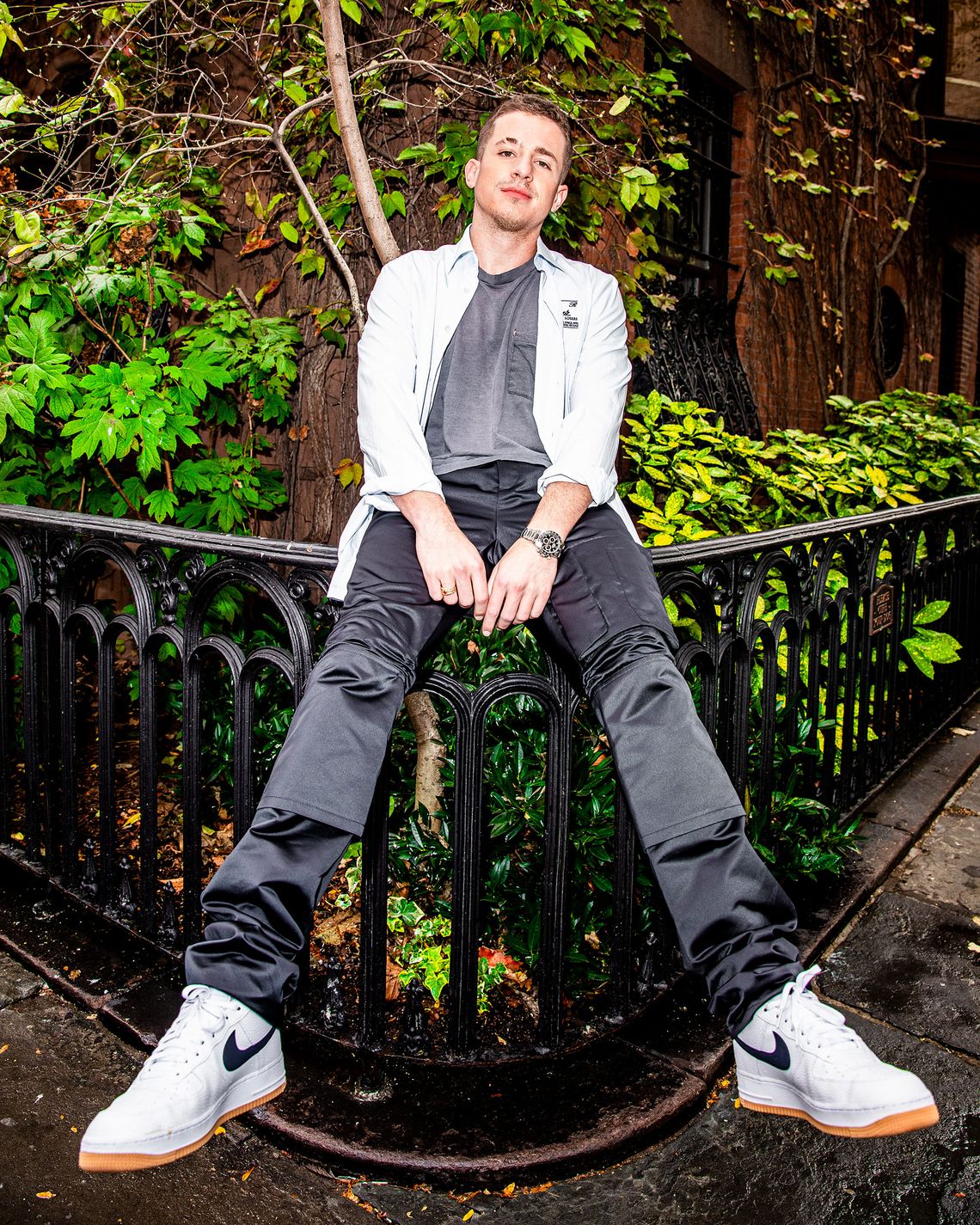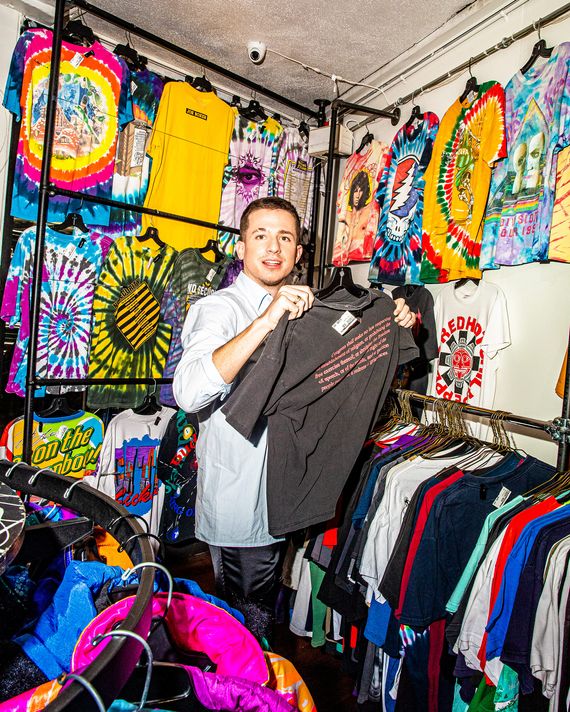
Will Somebody Please Break Charlie Puth’s Heart?
The singer-songwriter writes perfect love songs. Only problem? He’s never been in love.
by Hunter HarrisCharlie Puth goes right for the pop-music rack at Metropolis Vintage. The musician — known for one great album, one mediocre one, and the Fast & Furious song “See You Again” — is looking for a T-shirt from the ’90s or early aughts. He thumbs through about a hundred of them, brow furrowed. “I’m surprised there’s not more New York hip-hop,” he says. A shirt from ’N Sync’s first stadium tour almost makes him jump up and down with glee. “Don’t get a picture of me with this one,” Puth jokes to the photographer trailing us, pointing at a Bieber shirt.
Eventually, he settles on a $1,000 haul, including the ’N Sync shirt and a Black Sabbath hoodie. “I was gonna get the Incubus shirt, but it was a woman’s shirt; it wouldn’t fit right,” Puth says later. “But I love ‘Drive,’ by Incubus. It reminds me of 2003 in the best way.”
For the record: Incubus released “Drive” in 1999, a correction Puth might shudder to read. He has an encyclopedic knowledge of the recording industry and could probably pinpoint exactly what 2003 sounded like and why the pop gods decided it should sound that way. He has perfect pitch and is prone to interrupting his own sentences to tell you things like, That bird outside? It just squawked out a “B-flat.” The Beatles cover softly playing at the Rose Bar, where we’re hanging out for the day? That’s in “G major.”
Puth is a good singer, a good enough performer, but a genius producer.
His rushed 2016 debut album, Nine Track Mind, turned him into someone he claims he didn’t want to be. “[It] felt like a Twinkie factory,” he says. “Very manufactured, nothing had any personality to it.” Afterward, he recalibrated, self-producing all of 2018’s Voicenotes. There are songs about kissing the wrong girls, loving an older woman, a dress described as “karma,” perfume regret. It drips with an excited, lonely horniness in the way an ideal pop record should. (An episode of the New York Times’ Popcast declared that every Charlie Puth song categorically “fucks” — the erotic bass line on “Attention” was enough to make the three hosts blush.) In 2019, Puth reset again with three radically different singles from an album expected in 2020. “Everyone thought that I was just gonna put out another version of ‘Attention’ or ‘How Long,’ and I just wanted to put out the complete opposite kind of thing,” he says. Instead, “I Warned Myself” is about heartbreak — but sexy. It’s punctuated with a choking sound.
Puth is from New Jersey and graduated from Berklee College of Music in 2013. He was briefly a YouTuber, posting his music on the platform before he signed with Atlantic Records in 2015 and moved to Los Angeles. The 28-year-old is now on track to be a super-producer on the level of Ryan Tedder, the OneRepublic singer who has made hits for Beyoncé, Taylor Swift, and Adele. (“See You Again” was the biggest rap record in a decade until “Old Town Road.”) “I want to make hit songs for other people, be responsible for the beginning of their [careers], like how Max Martin was to Britney Spears,” he says. I gingerly remind him that when Martin was making hits for Spears, he wasn’t also a pop star himself. Puth grins. “I don’t know if it’s been done super-well before, but maybe I can do it.”

The pop-savant thing he can’t help. His brain is full of half-songs, almost-beats, and music trivia that it doesn’t really make sense for him to know. (In his spare time, he produced the Katy Perry song “Small Talk” from a melody he’d just been thinking about that day.) “I’m really surprised that ‘Oops! … I Did It Again’ wasn’t a No. 1 song,” he says, about 15 years after anyone else wondered about that. “I was depressed after I heard ‘Can’t Feel My Face,’ by The Weeknd, because I feel like they cracked the code. They opened a new door that hadn’t been opened yet,” he says, when I ask him to give a State of the Union on pop music today.
It’s funny and beguiling how he’s both super-famous and as insecure as any other 20-something. “I’m just a big, confused individual,” he says. “I’m finding more out about myself every day. Things I never knew about myself. It’s wild.” He had his second therapy session the day before we meet. “There was one thing I was going through, and months went by and I’m not fixing it like I usually can. I can usually distract myself, my mind, with music. But for the first time, I couldn’t.”
Puth reads his own press and has a social-media instinct to overshare. Before he answers my third question, he moves my recorder closer to him. “I just wanna make sure you don’t miss out,” he says. On Twitter, Puth has rather cryptically alluded to one of his new singles, “Mother,” having a secret meaning, or at least a read that’s different from what it’s about on the surface: a girl sneaking around with a boy behind her mom’s back. He dangles this fact, urging me to ask him about it. “Several years ago, I was in a very emotionally taxing relationship. It started to change my personality drastically. Without me even knowing it, I started distancing myself from my friends and people that I grew up with. From the outside, the relationship was pristine,” he says. But it felt toxic and twisted to him. “ ‘Mother’ just sounds like a fun song about a time ten years ago in my life, but it actually is quite the opposite,” he continues. “It’s weird hearing such a happy song on the radio and knowing what it really is about.”
Last year, he said he wanted to be the most approachable pop star there is. That’s still true, but he’s just as interested in playing with form and sound. He put a cowbell ring in “Attention,” a choice his co-producers thought was meant to be ironic. Puth’s music, though, is notably without irony. “It’s a rhythmic pocket that’s just feeling,” he says of the cowbell sound. “I added that and a couple of tin cans, and I really think that because of those percussive elements, the song had more texture.” He likes placing odd sounds in songs where they shouldn’t make sense.
So the music he understands instinctively. (If anything, the next challenge is paring down the production just to disprove his ideas about texture.) He’s less assured about his songwriting, which he quickly dismisses as simple. When asked what he thinks makes his music resonate with fans, he replies, “Probably that I take sentences that they say and put melodies to them. I don’t know if everyone can relate to the fact of being in their late 20s and not having ever said ‘I love you’ to somebody.” He gets scared that his fans are outfeeling him, that they’re more emotionally advanced than his music.
He can’t always name the feeling he’s after, but he knows it when he sees it: His favorite movie scene ever is in Clueless, just before Paul Rudd kisses Alicia Silverstone on the stairs. “He kind of Freudian-slip says, ‘Well, of course, you know, you’re really beautiful.’ And whoever fucking filmed that was so genius to not film him saying it,” he says. “They kept it on her face the entire time. It was almost an awkwardly long shot. She says, ‘You think I’m beautiful?’ ” Puth is practically bouncing in his seat as he recounts this. “I just get fucking chills! All over my — ‘You think I’m beautiful?’ I live for that fucking moment, man, in songwriting. How do I get that moment and put it into a song?” In this metaphor, Puth is Silverstone, or maybe he’s Rudd and the song is Silverstone? Either way, he takes out his phone and finds the scene on YouTube just to make sure I’m following along. The sound quality isn’t to his liking, so he turns up the volume, cups his phone’s speaker with his hand, runs the scene back, and plays it again.
It’s a paradox Puth thinks about a lot: He’s writing and producing endlessly listenable songs — bops, even! — about relationships he’s still chasing in real life. “Cheating on You” is about a feeling he hasn’t had (loving someone so much that every subsequent relationship only makes you miss them more) but one he’s desperate to experience. “I’ve never felt so enamored with somebody that I can’t bring myself to move on. And I’m not proud of that,” he says. “I want to have heartbreak, as masochistic as that is.” He just turned 28, but he thinks of himself as a late bloomer emotionally. “I didn’t experience a lot of things that people in their teens experience,” he says. “I didn’t even lose my virginity till I was like 21. Everything was super-delayed for me, ’cause I guess I was always just so focused on the music aspect. So now I’m having delayed emotions. I’m starting to feel all these things that I should’ve felt about people, anyone, long ago. Weird, right?”
So what is Puth actually looking for, other than a girlfriend? He knows how to make a hit song; it’s trickier to get out of his own head about absolutely everything else. “It’s like making a song that many people can relate to. If you overanalyze [it] too much, it’s gonna be stiff and rigid, and no one’s gonna like it,” he says. “But if it just happens naturally, you know — ” He stops himself. “Did I compare writing a song to finding someone to be in love with? Yes, I did. But that’s the only thing that I can relate it to.”
*This article appears in the December 9, 2019, issue of New York Magazine. Subscribe Now!